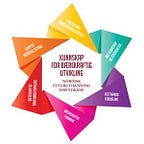Teaching textiles with a holistic approach to sustainability.
Noomi í Dali (Fo)
NoomiD@setur.fo
Project summary
When embarking on the project my starting point was the Faroese Material Culture seen as indigenous knowledge, especially referring to textiles, and the inclusion of sustainable teaching and learning methods in the major subject of textile arts for teacher students.
New thoughts and ideas, new ways of seeing oneself and society have the best opportunity for growth, if they are being learnt at a young age.
Therefore it cannot be stressed enough that teachers have a unique potential influence on coming generations. As a result it is of the utmost importance that teacher students should have both knowledge of ESD and believe in its relevance for the future of the community. Knowing that what we do will influence the environment and the options of future generations must be learned at an early age, together with the ability to make informed life choices.
The paper is divided into 3 parts. First I address sustainability in a Faroese context, exploring how the different aspects of sustainable development are perceived from a Faroese point of view, compared with UNESCO’s definitions of sustainability. Secondly I write about education for sustainable development, ESD, again from a Faroese angle, considering the education system as a whole. In this part I draw mainly on a study I made together with Eva Harðardóttir in 2012, of sustainability in the Faroese education system and society. The third part concerns the major study in textile arts that I am teaching, and which I have reformulated with sustainability as a holistic view on textiles.
